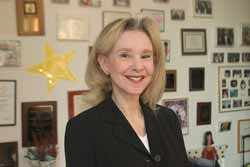Build It and They Will Come
One unmistakable sign that a school or program is becoming great is when it begins to develop "mentor chains": generational lines that run from particular faculty members to the students who worked with them, to the students who work with those students when they become faculty members-'and so on down the years.
TC has abounded in mentor chains in many subject areas throughout its history, but education policy, strangely, has not always been one of them.
It's not that the College hasn't attracted major stars in this field - to the contrary, its current faculty boasts some of the top names in the country.
"We have an amazingly policy-rich environment, with some absolutely stellar folks like Hank Levin, Jeanne Brooks-Gunn, Amy Stuart Wells and Tom Bailey - but our education policy work has been one of the best-kept secrets in academia," says Professor Sharon Lynn Kagan, the Virginia and Leonard Marx Professor of Early Childhood and Family Policy.
In part, that's because TC has no formal "education policy" department; instead, faculty who do policy work - and the courses they teach - are distributed across six different departments. On the positive side, that means students are free to mix and match by either developing expertise in a particular discipline and then adding a policy overlay, or in contrast, creating a policy major that draws from all fields. But the downside is that TC has lacked a true policy zeitgeist, with little being done to reward policy work or ensure that it makes an impact in the real world. In addition students have sometimes found it difficult to learn about - and successfully navigate - all the various policy-related offerings at the College.
To change that situation, last year the College named Kagan herself as its first Associate Dean for Policy. The choice was a no-brainer: Kagan-'"who, with Brooks-Gunn, co-directs the National Center for Children and Families-'"has advised education ministers around the world on early childhood learning standards and done the same for presidential administrations and state governments in the U.S. She has received virtually every major award in her field.
"When you talk to governors or visit people in Washington," says Darlyne Bailey, TC's Vice President for Academic Affairs and Dean, who created Kagan's job, "they say, -'Oh, you're at Teachers College - how's Lynn?'"
Yet Kagan brings another qualification to the job that may be even more important: she's a TC alumna with a very strong sense of just how the College shaped her own career.
"I came to TC as a Head Start director and elementary school principal, wanting to improve my practice, and I walked out as an academic researcher and policymaker," she says. "So each day, when I look at our students, I think, -'Here sits tomorrow's researcher, tomorrow's policy analyst, tomorrow's Congressperson or tomorrow's governor'-'"who knows?"
In her new role, Kagan - assisted by Wells, an expert on school choice and school segregation who has taken on the additional role of Coordinator for Policy Studies - has set out to, in her own words, "make TC the mecca for policy studies." In the short time she's been in the job, her office has established a 10-member Policy Advisory Committee, representing five academic departments, that is actively involved in decisions that bring policy to the fore; surveyed faculty and students on their needs; built stronger linkages between various departments; created a Web site that brings together all policy work being done at TC; created a policy fellowship (the first nine were awarded in 2005 with topics at the inaugural policy fellows forum ranging from rural Ethiopia to the interior of an upstate New York prison); launched a series of brown bag lunches and colloquia featuring some of the nation's leading policy scholars; developed a brochure that is being sent to experts around the country; advertised TC's policy strengths in the Chronicle of Higher Education and Phi Delta Kappan; and aligned her office with the work of TC's Campaign for Educational Equity, which itself seeks to affect education policies. Down the road, she's hoping to connect TC with other schools, as well as organizations such as the National Governors Association, the Council of Chief State School Officers and the Education Commission for the States. She'd also like to see TC build a stronger presence in
It's early days yet, but there are some clear indications that the veil of secrecy around education policy studies at TC is lifting. One of them is Kristi Kauerz, a student in a new doctoral program in Early Childhood Education and Policy taught by Kagan. Kauerz, who already holds degrees in political science and international development, worked for Colorado Governor Roy Romer in the mid-1990s, first as a policy advisor and then as Director of Community Development for Families and Children. From there, she joined the Education Commission of the States as Program Director, Early Learning, with a specific focus on birth through third grade.
With a rsum like that, why return to school?
"As my work became more visible and influential, I felt that I was not as effective as I could be in understanding research and then infusing it into my policy work," recalls Kauerz. At a conference six years earlier, she'd heard Kagan speak.
"When I heard she was starting a new doctoral program, I checked it out and it seemed almost personally designed for me," Kauerz says.
A key part of the program is a course Kagan teaches called the Federal Policy Institute, a hands-on exploration of issues ranging from school funding and high-stakes testing to determining who is qualified to teach. One of the highlights is a week spent in
Her choice this year: Kristi Kauerz.
Did someone say "mentor chain"?
Published Wednesday, Sep. 20, 2006
